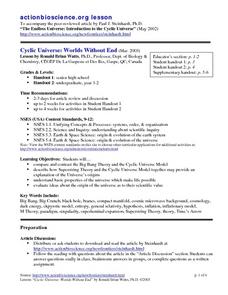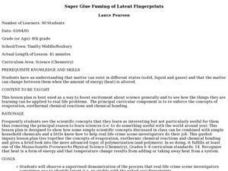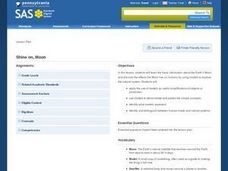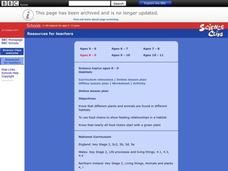Curated OER
Save the Bay!
Students explore environmental protection by creating a presentation in class. In this Chesapeake Bay lesson, students discuss the current threats from human beings towards the delicate balance of life near the bay. Students identify the...
Curated OER
Phases of Matter
Eighth graders practice using correct vocabulary and apply content knowledge related to phases of matter when answering questions about situations or observations from everyday life.
Curated OER
Tree Hunt
Students identify the common trees of Iowa and make observations while creating a key. In this tree hunt lesson, students write a letter to the Iowa Department of Natural Resources to receive a pamphlet of Common Trees of Iowa. Students...
Curated OER
Cyclic Universe: Worlds Without End
High schoolers compare and contrast the Big Bang Theory and the Cyclic Universe Model. They explain basic properties of the univers which make life possible. They evaluate ideas about the origin of the universe as to their scientific value.
Curated OER
Current Thinking About Magnets
Students construct their own magnet and wire device. In this inquiry lesson, students investigate the factors affecting the strength of magnetic forces. They manipulate different variable to determine their effect.
Curated OER
Super Glue Fuming of Latent Fingerprints
Students explore latent fingerprinting. They observe a supervised demonstration of the process that real-life crime scene investigators sometimes use to identify latent fingerprints. In addition, they brainstorm ways to improve the...
Curated OER
Tadpoles
Students examine tadpoles at various stages of development. They make careful scientific observations and compare the changes that occur at five different phases of a frog's life.
Curated OER
Teaching About the Properties of Water
Students use video, Internet research, graphs and tables, worksheets and hands-on experiments to investigate the properties of water in a lake environment. They work under direction or through an inquiry process.
Curated OER
It's a Small World After All! (Pond Microcosms)
Learners use microscopes to investigate the diversity of life that exists in pond water. They then conduct a controlled investigation to study the effect of a pollutant (rice) on a microcosm ecosystem.
Curated OER
Planetary Orbits
Students explore space science by completing a solar system identification worksheet. In this planets instructional activity, students discuss the different planets in our star system and identify their traits. Students complete an...
Curated OER
What's In The Forest?
Students examine forest food chains and create a forest habitat in the classroom. They are introduced to the concept of interdependence in Nature. They define a simple forest food chain and develop inquiry process skills.
Curated OER
Ocean Grazers Conclusion
Students research an ocean species. In this science lesson, students create a research presentation as a conclusion to the ocean grazers unit. Students present their projects to the class and complete a self-reflection paper.
Curated OER
Classification in Action
Young scholars work with a set of objects to set up both quantitative and qualitative classification systems. As a group, students follow an example to design and complete two classification systems using a set of objects provided. ...
Curated OER
Shine On, Moon
Students explore space science by conducting an experiment in class. In this Moon lesson, students define a list of space science vocabulary and read the book The Moon. Students utilize shoeboxes and string to conduct a sunlight...
Curated OER
Adapting to Seasonal Changes in the Environment
Fourth graders discuss how plants and animals, including humans, adapt to climate and seasonal changes. They research the Colville people, and create dioramas that represent life during different seasons for Colville people.
Curated OER
Whose Skeleton is in Your Closet?
Students analyze and measure parts of a model skeleton to determine sex, race, height and age. They produce a lab report from their inquiries.
Curated OER
Getting a Handle on Your Bee
Students observe dried bees, carefully glue them to toothpicks, and use them for cross pollinating their Brassica plants. They also describe reasons why two similar investigations can produce different results. Finally, students...
Curated OER
Habitats
Students investigate the habitats of living things and the cycle of the food chain. In this scientific inquiry online lesson plan, students examine the habitats of plants and animals as well as the food chain as they sort pictures of...
Curated OER
Habitat Collage
Students explore habitats. In this science lesson, students discuss habitats and the insects that are found within each habitat. Students create a habitat collage.
Curated OER
The Economic Way of Thinking - About Everything
Students write their definitions of economics on index cards and revise them as the lesson continues. They discuss the principles of economic reasoning and after completing a quiz, use economic reasoning to solve "real life" mysteries.
Curated OER
A Rainbow Under the Sea: How Do Animals Survive in the Ocean?
Second graders, with adult help, create a PowerPoint presentation on a selected ocean animal.
Curated OER
Through Other Eyes
Students describe the structures of crustaceans and the features that give organisms capabilities that exceed those of humans. In this investigative lesson plan students replicate some of the features of photo-receptors in a...
Curated OER
Forest Friends Forever
Learners investigate how to use the senses to gather information about objects such as size, shape, color, texture, sound, position, and change (qualitative observations are utilized throughout this lesson plan). They investigate and...
Curated OER
Microscopes: Is what you see, what you got?
Eighth graders identify the parts and functions of the microscope. In this biology instructional activity, 8th graders observe different samples under different types of microscopes. They compare and contrast the details they see.
Other popular searches
- Life Science Inquiry Fossils
- Life Science Inquiry Frogs
- Life Science Inquiry Lessons
- Life Science Inquiry Labs
- Life Science Inquiry Mammals
- Life Science Inquiry Chicken
- Inquiry Based Life Science

























